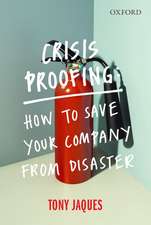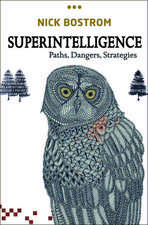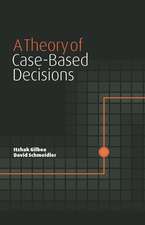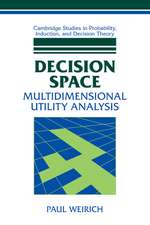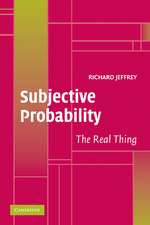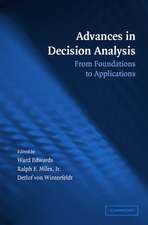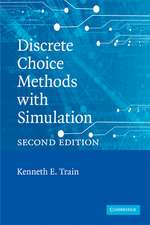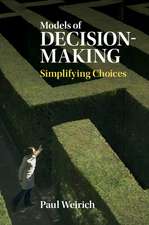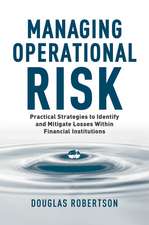Prospect Theory: For Risk and Ambiguity
Autor Peter P. Wakkeren Limba Engleză Paperback – 21 iul 2010
| Toate formatele și edițiile | Preț | Express |
|---|---|---|
| Paperback (1) | 369.92 lei 3-5 săpt. | +43.61 lei 10-14 zile |
| Cambridge University Press – 21 iul 2010 | 369.92 lei 3-5 săpt. | +43.61 lei 10-14 zile |
| Hardback (1) | 1034.06 lei 6-8 săpt. | |
| Cambridge University Press – 21 iul 2010 | 1034.06 lei 6-8 săpt. |
Preț: 369.92 lei
Nou
Puncte Express: 555
Preț estimativ în valută:
70.79€ • 73.64$ • 58.44£
70.79€ • 73.64$ • 58.44£
Carte disponibilă
Livrare economică 22 martie-05 aprilie
Livrare express 11-15 martie pentru 53.60 lei
Preluare comenzi: 021 569.72.76
Specificații
ISBN-13: 9780521748681
ISBN-10: 0521748682
Pagini: 518
Ilustrații: 106 b/w illus. 57 tables 187 exercises
Dimensiuni: 173 x 244 x 23 mm
Greutate: 1 kg
Editura: Cambridge University Press
Colecția Cambridge University Press
Locul publicării:Cambridge, United Kingdom
ISBN-10: 0521748682
Pagini: 518
Ilustrații: 106 b/w illus. 57 tables 187 exercises
Dimensiuni: 173 x 244 x 23 mm
Greutate: 1 kg
Editura: Cambridge University Press
Colecția Cambridge University Press
Locul publicării:Cambridge, United Kingdom
Cuprins
Preface; Introduction; Part I. Expected Utility: 1. The general model of decision under uncertainty no-arbitrage (expected utility with known utilities and unknown probabilities); 2. Expected utility with known probabilities - 'risk' - and unknown utilities; 3. Applications of expected utility for risk; 4. Expected utility with unknown probabilities and unknown utilities; Part II. Nonexpected Utility for Risk: 5. Heuristic arguments for probabilistic sensitivity and rank dependence; 6. Probabilistic sensitivity and rank dependence analyzed; 7. Applications and extensions of rank dependence; 8. Where prospect theory deviates from rank-dependent utility and expected utility: reference dependence versus asset integration; 9. Prospect theory for decision under risk; Part III. Nonexpected Utility for Uncertainty: 10. Extending rank-dependent utility from risk to uncertainty; 11. Ambiguity: where uncertainty extends beyond risk; 12. Prospect theory for uncertainty; 13. Conclusion; Appendices; References; Index.
Recenzii
'Peter Wakker's new book provides a brilliant account of what has happened in the field of decision theory during the last twenty years. Decision analysts will find here many tools and assessment techniques that will enlarge their usual bag of tricks. One of the virtues of the remarkable text is that it will help to reduce the gap between the models developed by decision theorists and the ones used in practice by most decision analysts. Every serious decision analyst should have a copy of this book at hand.' Denis Bouyssou, CNRS and Université Paris-Dauphine
'This is a long-overdue book, from one of the leading authorities in the field. Wakker is a leader both on the theoretical underpinnings of decision theory and in applying decision theory to practice; he also has an encyclopaedic knowledge of the field. The book is structured in a way that should make it easily accessible to a broad audience, from more mathematically-oriented readers interested in the foundations to practitioners interested in applying the ideas.' Joseph Y. Halpern, Cornell University
'This masterful survey of major theories of choice and of their implications for measurement represents two decades of research and teaching by a flawless perfectionist. Wakker's view of the field is scholarly, coherent and deeply personal.' Daniel Kahneman, Princeton University and Nobel Laureate in Economic Sciences, 2002
'This book organizes, develops and presents both the classical expected utility and newer non-expected utility models of decision making in a way that only Peter Wakker could do. Readers interested in understanding how individuals do, and how they should, make decisions under conditions of risk or uncertainty could do no better than to consult this volume.' Mark Machina, University of California, San Diego
'Peter Wakker's book conveys the beauty and practical value of formal thinking about decisions with uncertainty, with minimal mathematical fuss. Scholars who have lived with this material for years will still find much that is new.' Drazen Prelec, Massachusetts Institute of Technology
'The need for realistic models of economic decisions involving risk and uncertainty, with plausible behavioral foundations, has never been more acute. Peter Wakker provides an intuitive and accessible, but rigorous, treatment of prospect theory, widely accepted as the main alternative to the hyper-rational expected utility model. This is the only book-length treatment of this important topic, and seems certain to dominate the field for years to come.' John Quiggin, University of Queensland
'This is a long-overdue book, from one of the leading authorities in the field. Wakker is a leader both on the theoretical underpinnings of decision theory and in applying decision theory to practice; he also has an encyclopaedic knowledge of the field. The book is structured in a way that should make it easily accessible to a broad audience, from more mathematically-oriented readers interested in the foundations to practitioners interested in applying the ideas.' Joseph Y. Halpern, Cornell University
'This masterful survey of major theories of choice and of their implications for measurement represents two decades of research and teaching by a flawless perfectionist. Wakker's view of the field is scholarly, coherent and deeply personal.' Daniel Kahneman, Princeton University and Nobel Laureate in Economic Sciences, 2002
'This book organizes, develops and presents both the classical expected utility and newer non-expected utility models of decision making in a way that only Peter Wakker could do. Readers interested in understanding how individuals do, and how they should, make decisions under conditions of risk or uncertainty could do no better than to consult this volume.' Mark Machina, University of California, San Diego
'Peter Wakker's book conveys the beauty and practical value of formal thinking about decisions with uncertainty, with minimal mathematical fuss. Scholars who have lived with this material for years will still find much that is new.' Drazen Prelec, Massachusetts Institute of Technology
'The need for realistic models of economic decisions involving risk and uncertainty, with plausible behavioral foundations, has never been more acute. Peter Wakker provides an intuitive and accessible, but rigorous, treatment of prospect theory, widely accepted as the main alternative to the hyper-rational expected utility model. This is the only book-length treatment of this important topic, and seems certain to dominate the field for years to come.' John Quiggin, University of Queensland
Notă biografică
Descriere
A text in decision theory with applications to economics, mathematics, finance, psychology, management, health, computer science, statistics, and engineering.

